FW

The future of apparel manufacturing is here, and it’s smarter, faster, and more integrated than ever. This was the overwhelming takeaway from the recent China International Sewing Machinery & Accessories Show (CISMA), a massive showcase of innovation that highlighted the global industry's rapid shift from manual labor to automated, data-driven production. The exhibition, spanning over 40 acres, featured more than 1,600 exhibitors, almost exclusively from China, demonstrating a new era of "intelligent sewing."
The rise of the ‘Smart Factory’
At the heart of CISMA's new developments was the commoditization of complexity. Exhibitors unveiled a wide range of machines and integrated systems designed to perform multiple operations at a single workstation. This approach significantly reduces the need for human intervention, boosting productivity and cutting down on the number of operators required per garment. Technologies on display included:
● Template-based sewing: Machines pre-programmed to follow intricate patterns, combining multiple sewing steps into a single, seamless operation.
● Camera-based automatic sewing: Using visual AI to detect and guide fabric in real-time, ensuring millimeter-perfect precision and consistent quality.
● AI and robotics: Robotic arms and AI-powered systems handled everything from fabric cutting and material handling to sorting and final assembly, creating a highly efficient, automated workflow.
● Single-layer cutting: Advanced cutting tables, utilizing visual AI, now perform single-layer cuts with extreme accuracy, minimizing waste and enabling on-demand, customized production.
● Automated embroidery: Machines capable of replicating the intricate work of hand embroidery with digital precision. Some of these machines even use thread printing technology, eliminating the need for constant thread changes by printing colors directly onto a single base thread.
Data, efficiency, and the new reality
A key theme at CISMA was the power of data. The exhibition floor was a testament to the Internet of Things (IoT) in manufacturing, with machines, workstations, and entire production lines linked by a network of sensors and software. Factory-wide dashboards provided live, accurate data on every operation, allowing managers to monitor productivity, track material flow, and identify bottlenecks in real-time. This level of oversight and control is critical for optimizing production and responding quickly to changing demands.
The impact of these technological leaps is profound. Experts at the exhibition estimated a 40% reduction in the Standard Allowed Minutes (SAM) per garment, a critical metric for production efficiency. This is coupled with a dramatic 60-70% drop in automation costs, making advanced technology more accessible than ever before. For an industry that has long relied on low-cost labor, this presents a paradigm shift. With AI-driven machines now capable of stitching a T-shirt from start to finish with a single operator, the cost of production in highly automated factories is becoming competitive with, and in some cases even cheaper than, production in countries with traditionally low wages.
The Global Implications: Cheap labor is a liability
The developments at CISMA highlight a stark reality for the apparel industry worldwide: cheap labor is no longer an asset but a liability. The technologies showcased—which have been in development for years—have now been perfected and scaled to a point where they are becoming the industry standard. As automation and AI make labor less of a factor in production costs, countries and companies that fail to adopt these advancements will struggle to compete on productivity, efficiency, and quality.
The exhibition served as a wake-up call, demonstrating that the question for the modern apparel industry is no longer "Can we afford to automate?" but rather, "Can we afford not to?" The industry's future is defined not by the number of hands on the factory floor, but by the intelligence and interconnectedness of the machines they operate.
A global textile leader with a 220-year history, WestPoint Home officially launched the Phase 1 of its towel production line at its advanced manufacturing complex in the Kingdom of Bahrain. This expansion strengthens the company’s economic footprint and makes the facility the Middle East's only single-site manufacturer of both high-quality linens and towels.
The new line represents an additional $5 million investment into WestPoint Home’s Bahrain operations. Since establishing its presence in the country in 2006, the company has invested over $165 million, underscoring its commitment to manufacturing excellence and promoting tAbdulla bin Adel Fakhro, he ‘Made in Bahrain’ brand internationally.
The inauguration ceremony was attended by dignitaries including Abdulla bin Adel Fakhro, Minister of Industry and Commerce and Noor bint Ali Alkhulaif, Minister of Sustainable Development. Elizabeth Litchfield, Chargé d'Affaires, US Embassy in Manama, noted, US investment from WestPoint Home has supported innovation and benefited the US-Bahrain manufacturing sector for nearly two decades.
The new production line adds the capacity to manufacture premium towels, bathrobes, and bathmats alongside the company’s existing premium bedding and home textiles. Built with sustainability in mind, the facility is designed for reduced environmental impact. Phase 1 is expected to produce 4 million towels annually.
From its vertically integrated Bahrain complex - which handles everything from spinning and weaving to finishing and stitching - WestPoint Home supplies major global markets, including the US, UK, Europe, and the GCC. The company has already exported over $1 billion in products to the United States alone and produces textiles for leading customers like Ralph Lauren, Marriott, and Amazon.
The expansion also deepens WestPoint Home's contribution to local employment. The company currently employs about 1,300 people in Bahrain, including nearly 101 Bahraini nationals in key corporate and technical roles, reinforcing its standing as a major local employer.
Terming the launch as a ‘proud milesone,’ Jonathan Storie, President and CEO, WestPoint Home, says, the expansion is facilitated by Bahrain’s business-friendly environment, modern infrastructure, and supportive government partnerships. The investment advances their global customer service capabilities while creating new opportunities for their local workforce, he adds.
Looking ahead, the company also plans to launch the Phase 2 of the towel production line, Subject to the conclusion of negotiations for a GCC–UK Free Trade Agreement (FTA), the project allow WestPoint Home to significantly expand its exports and sales into the UK market.
Japanese clothing giant Uniqlo plans to expand its European operations by opening its maiden store in Prague, Czech Republic, according to the Czech business newspaper Hospodářské noviny (HN).
Currently operating in 11 Western European countries, Uniqlo is actively looking for a prime location in Prague’s city center.
According to Tomáš Beránek, CZ Retail Advisors, the launch is likely to happen after 2026, citing the time required to secure a suitable site and complete necessary renovations.
Uniqlo's entry into Prague is a major step in its broader European strategy. The brand has zeroed in three potential locations for the flagship store. These include the Hybernia Palace on Náměstí Republiky, the former Komerční banka (KB) headquarters at 33 Na Příkopě Street and the Children’s House also on Na Příkopě Street.
The Spring-Summer 2026 season of Paris Fashion Week officially launched with shows from Saint Laurent and Weinsanto. Almost a dozen major brands are set to unveil their new collections under new creative directors at this event.
The biggest attraction of the event is the debut collection from Matthieu Blazy for Chanel. This 41-year-old Franco-Belgian designer faces the challenging task of following Virginie Viard, who successfully kept the brand’s momentum high after the passing of the legendary Karl Lagerfeld in 2019. Having first gained attention at Maison Margiela, Blazy will present his collection on October 6.
Other high-profile debuts to feature in this event include Jonathan Anderson, who will present his first women’s collection for LVMH-owned Dior on October. Taking the reins at Balenciaga, Pierpaolo Piccioli will succeed the provocative, streetwear-focused Demna and Duran Lantink will step in as the first permanent artistic director for Jean Paul Gaultier since the founder retired in 2020.
Other first-time collections include Jack McCollough and Lazaro Hernandez at Loewe, Miguel Castro Freitas at Mugler, and Mark Thomas at Carven.
The event will also feature the second collections from major designers including Sarah Burton for Givenchy, Glenn Martens for Maison Margiela, and Haider Ackermann for Tom Ford. Established houses like Louis Vuitton and Hermès are also presenting, alongside the return of labels like Celine and Thom Browne.
Separately, Victoria Beckham will showcase her latest designs on October 3, just before her new Netflix documentary airs, further adding to the week’s buzz. This dense schedule promises a Fashion Week ‘without downtime.’
Womenswear and lifestyle label, Club L London has launched its maiden collection on Middle East's premier luxury e-commerce platform, Ounass. A crucial step in the brand’s global expansion, this move strengthens its formal presence in the region’s premium retail market.
From its Emimence collection, Club L London features a curated selection on the platform offering exclusive styles that showcase its signature elevated occasionwear and modest-inspired silhouettes.
The brand plans to design future seasonal edits specifically for the Middle East. Furthermore, it aims to invest in the region through influencer collaborations, pop-up experiences, and targeted campaigns.
Katie Randev, Founder and CEO, Club L London, states, the brands’ partnership with the luxury fashion platform Ounass reflects a strong market demand. Being part of this curated platform reflects the strength of the brand’s customer base and the appetite for elevated occasionwear across the region, she adds.
This launch follows a landmark year for the brand, which saw impressive international expansion and revenue growth, including more than 300 per cent Y-o-Y growth in the Middle East region alone. With 10 international websites now live, including dedicated sites for the UAE and Germany, the business is scaling rapidly, confirms Ramdev.
Voicing strong concerns regarding proposed restrictions on per- and polyfluoroalkyl substances (PFAS) in apparel to the New York State Department of Environmental Conservation (DEC), American Apparel & Footwear Association (AAFA) has urged the department to reconsider the extremely low proposed limits and to explicitly exempt products made with recycled materials.
The DEC’s proposal suggested setting limits as low as 25 parts per billion (ppb) across ten specific PFAS substances for all apparel products and components. Chelsea Murtha, Senior Director-Sustainability, AAFA, argued this is not only inordinately expensive but is also inconsistent with other state laws. Testing for multiple specific analytes at such granular levels on every component, from zippers to screen prints, would create a tremendous strain on both manufacturers and the department’s resources.
To promote a simpler, more unified regulatory landscape, the AAFA suggested, New York mirror California by adopting a single limit for Total Organic Fluorine (TOF). They recommend a TOF limit of 50 ppm, noting that a recent Notre Dame study found that a TOF result of less than 100 ppm indicates PFAS were not intentionally added. This TOF-only approach, which measures the total amount of organically bound fluorine, is preferred as low concentrations of specific PFAS analytes pose a low chance of exposure and may be present as unintentional trace contamination. The AAFA also requested that companies be allowed to provide evidence to rebut the presumption of intentionally added PFAS if they exceed the TOF limit.
Furthermore, the AAFA strongly advocated for the explicit exemption of products made with at least 50 per cent recycled content from the PFAS regulation. This is critical for promoting the DEC’s stated goal of creating a circular economy. Citing the Apparel and Footwear International RSL Management (AFIRM) Group, AAFA noted, it's currently not ‘economically viable’ for recyclers to sort out products containing PFAS, making a recycled content exemption necessary to enable the industry's shift toward sustainable and circular production.
Apparel imports by New Zealand slowed to 2.81 per cent Y-o-Y to NZ$1.425 billion during the January–August 2025 period. Imports of knitted or crocheted garments increased by 3.6 per cent during this eight-month period while non-knitted apparel imports experienced a 1.8 per cent modest rise. Fabric imports by the country grew by 22.5 per cent during the period.
However, New Zealand registered a 4 per cent Y-o-Y decline in apparel imports in August 2025 compared to the corresponding month in the previous year. Despite this dip, overall import trend indicates, the market remains resilient with imports projected to meet or slightly surpass 2024 levels, reflecting consistent consumer demand in the country.
Australia’s cotton export market faced a significant downturn in the first seven months of 2025, spanning January to July 2025.
The average price for Australia’s cotton exports declined to $1.81 per kg during this period, representing a 35.7 per cent contraction since 2022. This decline is a part of a consistent trend, following prices of $2.82 per kg in 2022, $2.52 per kg in 2023, and $2.09 per kg in 2024.
Compared to the average price of $2.17 per kg during the same period in 2024, the Y-o-Y reduction reflects both suppressed global consumption and competitive pressure from rival suppliers like the US and Brazil.
Consequently, the total export value declined by 46.3 per cent to $594.3 million. In terms of volume, exports slipped by 16.5 per cent to 327.6 million kg, down from 392.2 million kg in the first seven months of the previous year.
This drop in volume was primarily caused by a smaller domestic crop due to adverse weather in some growing regions, compounded by slower purchasing activity from major international buyers. Despite these challenges, Asia remains the primary destination for Australia’s cotton, with China leading the export share at 35.4 per cent, followed by Bangladesh, Vietnam, India, and Indonesia.
Manmade and Technical Textiles Export Promotion Council (MATEXIL) is set to host its 2nd Export Awards for Technical Textiles on November 19, 2025, at NESCO in Mumbai. The event will honor the outstanding export performance of technical textiles companies for FY23-24 and FY24-25.
The event is likely to be attended by Union Ministers, senior Government officials, and leaders of the technical textiles industry. According to Shaleen Toshniwal, Chairman, MATEXIL, the awards will recognize exporters across all 12 technical textiles segments including Agrotech, Buildtech, Clothtech, Geotech, Hometech, Indutech, Meditech, Mobiltech, Protech, Packtech, Sportech and Specialty Fiber
In addition to these category awards, two special honors -the MATEXIL Special Award and the Specialty & Innovative Technical Textiles Award - will be presented to promote innovation and excellence within the sector.
Pramod Khosla, Convenor, Sub-Committee for Technical Textiles, MATEXIL, notes, there is a need to support and motivate both existing and young exporters to drive growth in technical textiles exports. Recognizing their contributions will encourage the next generation to play a stronger role in India's growing global trade.
The event is likely to be attended by over 1,000 companies in the sector. This strong participation will help showcase the dynamism of the technical textiles industry in India, asserts Toshniwal.
The event aims to celebrate exporter achievements, inspire further innovation, and encourage the industry to reach greater heights in global markets.
Moscow Fashion Week, held from August 28 to September 2, 2025, wasn't just a showcase of beautiful clothing; it was a glimpse into the future of fashion. With the BRICS+ Fashion Summit running concurrently, the event served as a dynamic platform where creativity, sustainability, and cutting-edge technology converged. This season, designers embraced a forward-thinking approach, using AI, 3D printing, and upcycling to create collections that were both innovative and responsible.
AI-Powered couture
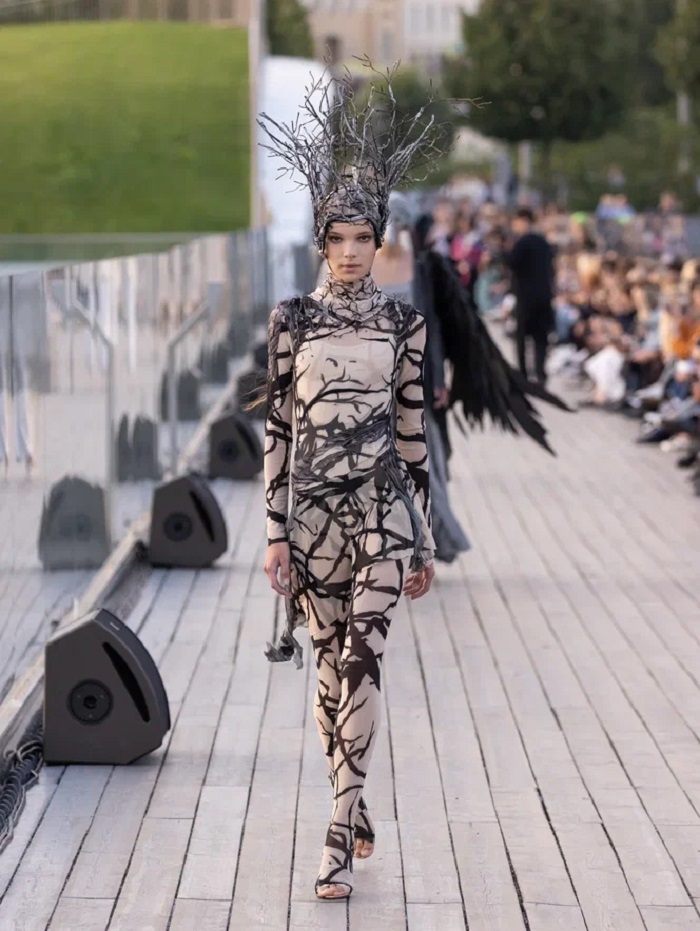
The most striking example of the fusion of fashion and technology was Mandragora's show, "Al Collection 1869/2025. Digital Heritage." In a groundbreaking collaboration with Sber, the brand reimagined an unfinished opera by Pyotr Tchaikovsky. The collection's libretto was co-written by the GigaChat AI, the musical score was composed by SymFormer AI, and the scenography was designed by Kandinsky AI. This project demonstrated how human artistry can guide artificial intelligence to create new forms of high art, merging a historical narrative with a truly futuristic vision.
Sustainability and upcycling
Designers also addressed the critical topic of sustainability, turning old materials into new, covetable pieces.

Alexander Arutyunov's collection was a deeply personal statement, created entirely from the brand's archival fabrics. He described it as a personal decision to "stop the flow of the new" and look inward, showcasing how a beautiful collection can be built from what already exists.

The Omsk-based brand Katler specialized in upcycling with its "Reimagine" collection, transforming seemingly identical silhouettes into one-of-a-kind creations.
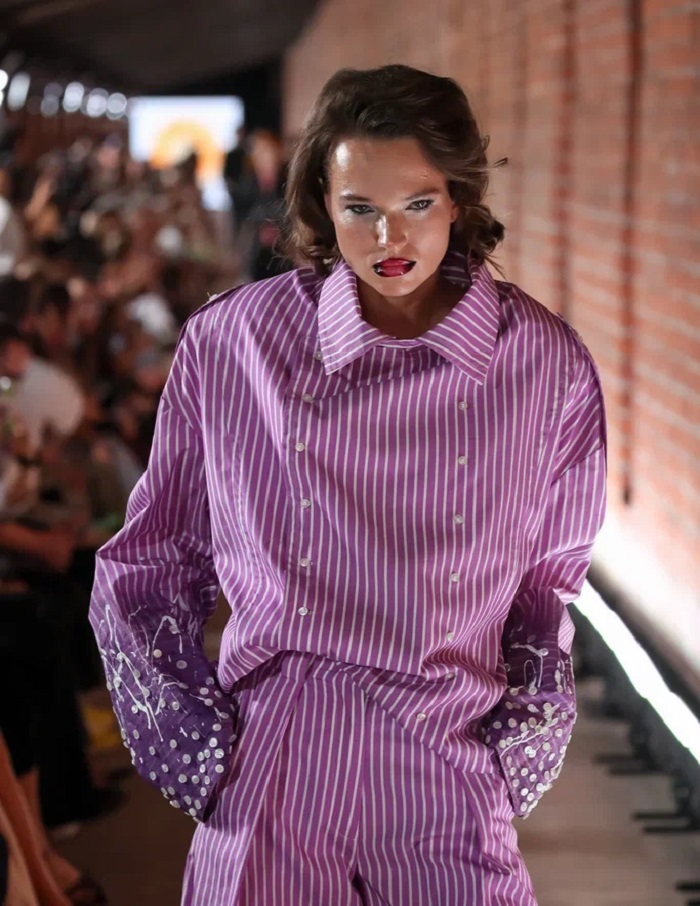
Boyari showcased sustainable materials like Appleskin and Tencel,
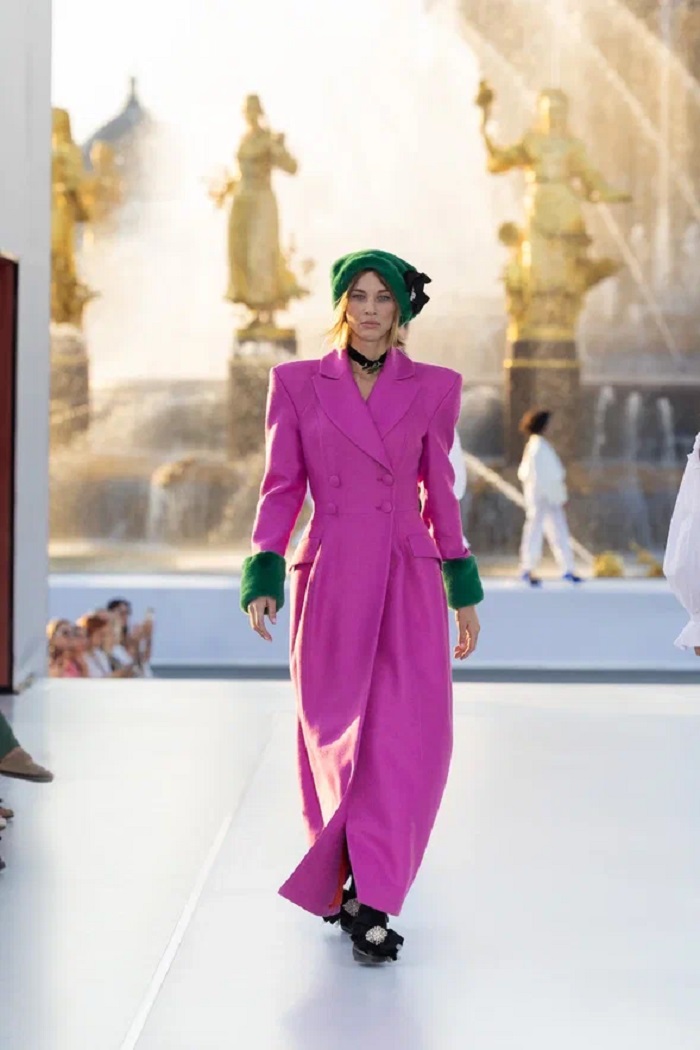
while Alena Cojocaru's designs for Empress Catherine II were enhanced with upcycled elements from her own archives.
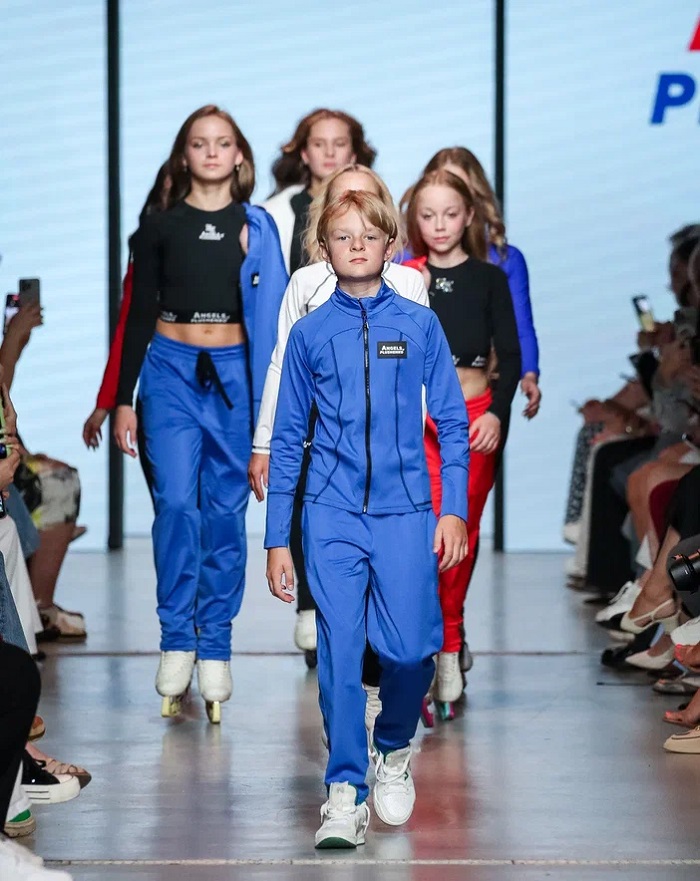
Even in children's fashion, Katee's Kids collaborated with figure skating legend Evgeni Plushenko on a sportswear line that was both functional and mindfully produced.
Futuristic and avant-garde
The runway also became a stage for bold, futuristic expressions. Artemisi from Brazil merged the medieval "castlecore" trend with cutting-edge technology, featuring 3D-printed tops with intricate, lifelike patterns. Ogo Citizen from Yakutsk explored the concept of "transformation" through deformed silhouettes and rigid structures that resembled forms born from chaos, creating an otherworldly, almost sci-fi aesthetic.
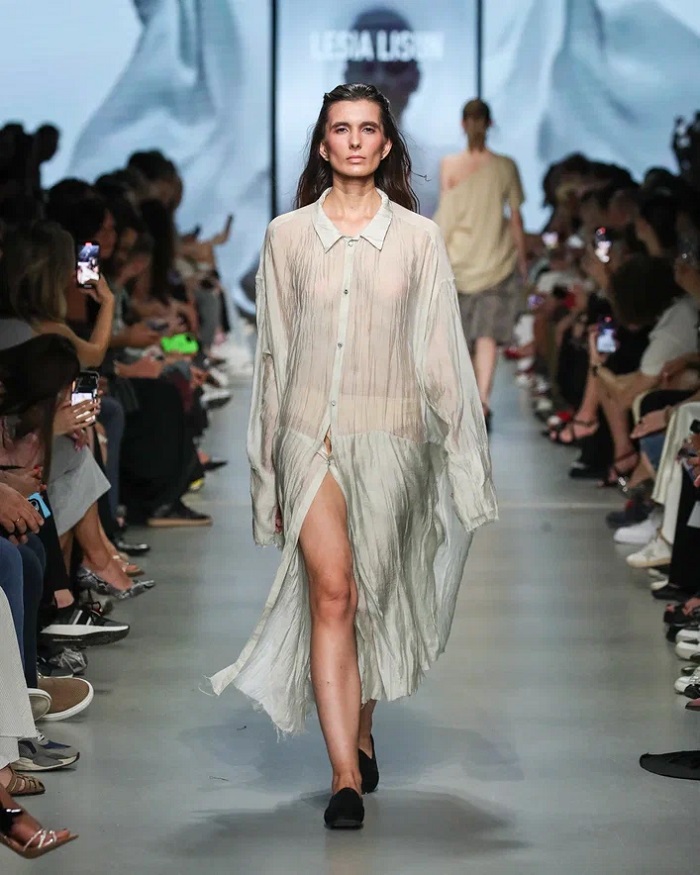
The brand Lesia Lisun continued its signature deconstructivist avant-garde aesthetic, while Pirosmani collaborated with media artists to present a Gothic-inspired collection with hand-painted fabrics and graphic prints.
This season, Moscow Fashion Week highlighted a compelling vision for the fashion industry—one that looks to technology and innovation not just for efficiency, but as powerful tools for storytelling and conscious creation.












